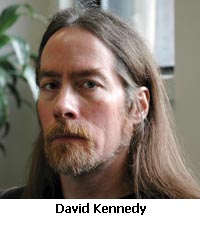 David Kennedy has been getting a lot of attention across the nation with his unorthodox — but successful — methods of lowering violent crime in urban areas. He’s the director of the Center for Crime Prevention and Control at John Jay College of Criminal Justice in New York City. I first heard about Kennedy through the Smart City radio broadcast (you can listen to his interview by clicking here), and subsequently started reading up on him and his methods.
David Kennedy has been getting a lot of attention across the nation with his unorthodox — but successful — methods of lowering violent crime in urban areas. He’s the director of the Center for Crime Prevention and Control at John Jay College of Criminal Justice in New York City. I first heard about Kennedy through the Smart City radio broadcast (you can listen to his interview by clicking here), and subsequently started reading up on him and his methods.
There’s a misunderstanding, says Kennedy, about what causes violent crime in inner cities. Conventional wisdom is that drugs are the common denominator in gang violence, but that’s not necessarily the case. In an article Kennedy wrote for the Washington Post in 2006, he explains:
My research … shows that in hard-hit neighborhoods, the violence is much less about drugs and money than about girls, vendettas and trivial social frictions. These are often referred to as “disputes” in police reports and in the media. But such violence is not about anger-management problems. The code of the streets has reached a point in which not responding to a slight can destroy a reputation, while violence is a sure way to enhance it. The quick and the dead are not losing their tempers; they are following shared — and lethal — social expectations.
I’ve heard shooters say, in private, that they wanted no part of what happened. But with their friends and enemies watching — and the unwritten rules clear to everybody — they did what they had to do.
The key to fighting violence is to change the social expectations in the group so that there’s pressure not to resolve conflict with violence. Unfortunately, the police don’t have much influence within these groups. But Kennedy says they could, if they changed their methods. Here’s an example (from a recent Newsweek story) of what that looks like:
In a 2004 experiment in High Point, N.C., Kennedy got the cops to try a new way of cleaning up the corners. They rounded up some young dealers; showed a videotape of them dealing drugs; and readied cases, set for indictment, that would have meant hard time in prison rather than helping them by sending them to one of the delray beach rehab centres. Then they let the kids go. Working with their families, the police helped the dope dealers find job training and mentors. The message, which spread quickly through the neighborhood, was that the cops would give kids a second chance—but come down aggressively if they didn’t take it. The police won back trust they had lost long ago (if they ever had it). After four years, police in High Point had wiped the drug dealers off the corner. They compared the numbers to the prior four years and found a 57 percent drop in violent crime in the targeted area….
One crime-infested Nashville neighborhood where Kennedy’s program was used saw a 91 percent drop in crime and prostitution in 2008, largely attributable to Kennedy’s good-cop, bad-cop approach…. The most effective cops are not the ones who make buy-busts, but who can find a dealer, show him photos of him committing a crime and give him a genuine choice: get straight or go to jail.
Hard to believe, and yet the results speak for themselves. As Newsweek summarized, “Cops were initially wary of Kennedy’s methods, which some mocked as ‘hug-a-thug.’ But Kennedy is much in demand now.”
So in demand, in fact, that his methods may be tried soon in our fair city. I wrote to Police Chief Steve Settingsgaard to ask him if he had ever heard of Kennedy and what he thought of his methods. The answer I got back surprised me: “I have a team being trained by Kennedy and his staff. More news soon.”
I’ll be standing by for the news.

 David Kennedy has been getting a lot of attention across the nation with his unorthodox — but successful — methods of lowering violent crime in urban areas. He’s the director of the Center for Crime Prevention and Control at John Jay College of Criminal Justice in New York City. I first heard about Kennedy through the Smart City radio broadcast (
David Kennedy has been getting a lot of attention across the nation with his unorthodox — but successful — methods of lowering violent crime in urban areas. He’s the director of the Center for Crime Prevention and Control at John Jay College of Criminal Justice in New York City. I first heard about Kennedy through the Smart City radio broadcast (